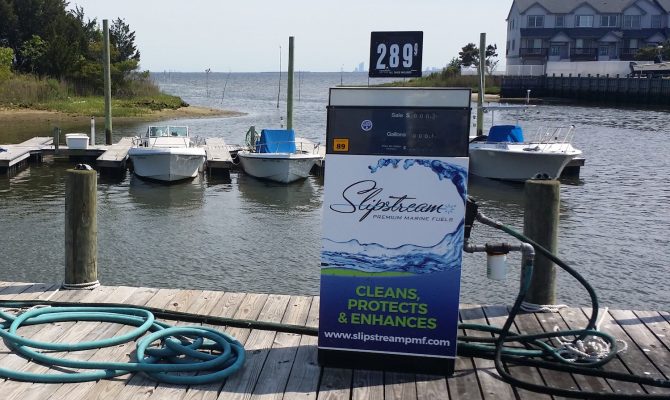I’m talking about your fuel.
As you’re pumping fuel into your boat, whether it be ultra-low-sulfur diesel (ULSD) or ethanol-blended gasoline, you’re probably not thinking about the expansive petroleum supply chain down which it traveled — being transported and stored, repeatedly off-loaded and on-loaded — en route to the local marina. And, like most consumers, you’re probably not aware of the water, microbial life and sediment that inevitably found its way into the fuel over the course of its journey from the refinery. And so, later on, when white smoke is billowing from your engine or you’re prematurely having to replace fuel filters, hoses, gaskets or other components, or your engine won’t start, or it stalls in the middle of a cruise, you probably won’t realize that it’s those contaminants to blame.
Fuel contamination is one of the leading causes of engine performance loss and failure. The most common and harmful contaminant to petroleum fuel, which is water, can get into the fuel during refining, storage, transportation and delivery, or it can leak into your tank from around the fill cap, be driven in through your engine’s ventilation system or form inside the tank as condensation. In ethanol-bended gasoline, water will be absorbed by the ethanol and fall out of solution in a process known as phase separation, which can decrease fuel longevity, cause rust and corrosion, and interrupt the flow of gas to the engine altogether.
In both gasoline and diesel fuel, water will promote the proliferation of bacterial cells or fungal spores known in the industry as “bugs,” which will live in the water at the bottom of the tank and consume the hydrocarbons in the fuel, as well as rubber gaskets, O-rings, hoses, tank linings and coatings in an effort to obtain their mineral content. The waste from this process produces more water, sludge, acids and other harmful byproducts. On a warm spring or summer day, bacteria can double in population every 20 minutes, forming destructive, gel-like colonies known as biofilms. If not addressed, the proliferation of bugs will clog fuel filters, fuel lines and gauges; corrode pumps, injectors and tank bottoms; cause washers, hoses and connectors to swell and blister; degrade fuel and reduce fuel economy.
Even if contamination isn’t your problem — even if your fuel were hand-delivered from the refinery in an airtight sterile drum — there are a number of other operability issues inherent in marine fuel. The ethanol content of today’s gasoline acts as an aggressive solvent that can cause problems with rubber hoses, O-rings, seals and gaskets, or can dislodge deposits in the tank and clog filters and fuel lines. Ethanol also displaces oil and forms a primary bond with metal surfaces, providing virtually no lubrication and resulting in significantly increased engine wear. Because it has less energy (BTUs) per gallon than regular unleaded gasoline, the more ethanol found in fuel, the worse your fuel economy will be.
Today’s ULSD doesn’t come without its own set of operability concerns. Because sulfur acts as a natural lubricant, ULSD is “dryer” than traditional diesel, meaning that it’s lower in lubricity, more prone to holding water and more susceptible to microbial contamination. Salts that are commonly found in diesel — some of which are intentionally added, others from contaminants including seawater — are less soluble in USLD and can be abrasive to engine components and deadly to fuel injectors. The refining process used to remove sulfur also removes oxygen, nitrogen and other functional elements, yielding a fuel that is less stable in storage. ULSD is also more solvent, or liable to loosen filter-plugging deposits in tanks.
These are just a few of the common fuel deficiencies that many boaters don’t even realize they’re experiencing. The common response, if any, is to self-medicate with after-market bottled additives or replace fuel system components prematurely.
A wiser, more cost-effective approach is to prevent fuel-related problems before they occur by choosing a premium product at the pump. A high-quality premium marine fuel, whether diesel or gasoline, is blended with a multifunctional additive package composed of fuel enhancers to ensure greater efficiency and improved engine performance on the water. An effective marine fuel treatment should include detergents to keep tanks and injector systems clean and free of carbon deposits; a stabilizer to protect against thermal exposure and long-term storage; moisture control to manage free water that can lead to engine problems; a lubricity improver to protect metal moving parts from excess wear; and a corrosion inhibitor to protect tank linings and system components from fuel’s naturally corrosive qualities.
Unless you have a firm understanding of the latest additive technology and appropriate treat rates, it’s imperative to work with a fuel or additive supplier who does. Purchasing a pre-blended premium fuel from a reputable, high-volume dealer or marina is a good way to ensure that the fuel is properly treated at the right dosage, taking the guesswork out of it for you, the consumer. The proper application of an advanced multifunctional additive package will ultimately lower your fuel consumption, decrease maintenance and repair costs, and maximize your time, power and safety on the water.
Author: Paul Nazzaro of Advanced Fuel Solutions, Inc. For more information, contact him at 978-258-8360 x301 or paulsr@yourfuelsolution.com.



